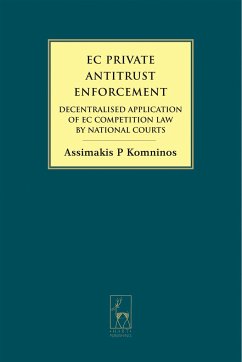Assimakis Komninos
EC Private Antitrust Enforcement
Decentralised Application of EC Competition Law by National Courts
Assimakis Komninos
EC Private Antitrust Enforcement
Decentralised Application of EC Competition Law by National Courts
- Gebundenes Buch
- Merkliste
- Auf die Merkliste
- Bewerten Bewerten
- Teilen
- Produkt teilen
- Produkterinnerung
- Produkterinnerung
This book, written by an academic-cum-practitioner with substantial experience in the field of antitrust enforcement, presents the rise of private enforcement of competition law in Europe, especially in the context of the recent modernisation and decentralisation of EC competition law enforcement. In particular, the study examines the role of courts in the application of the EC competition rules and views that role in the broader system of antitrust enforcement. The author starts from the premise of private enforcement's independence of public enforcement and after examining the new…mehr
Andere Kunden interessierten sich auch für
![Market Power in EU Antitrust Law Market Power in EU Antitrust Law]() Luis Ortiz BlancoMarket Power in EU Antitrust Law239,99 €
Luis Ortiz BlancoMarket Power in EU Antitrust Law239,99 €![The Boundaries of EC Competition Law The Boundaries of EC Competition Law]() Okeoghene OduduThe Boundaries of EC Competition Law149,99 €
Okeoghene OduduThe Boundaries of EC Competition Law149,99 €![Antitrust and the Multivalued Function of Competition Antitrust and the Multivalued Function of Competition]() Luiz Felipe Rosa RamosAntitrust and the Multivalued Function of Competition132,99 €
Luiz Felipe Rosa RamosAntitrust and the Multivalued Function of Competition132,99 €![The Evolution of Antitrust in the Digital Era The Evolution of Antitrust in the Digital Era]() The Evolution of Antitrust in the Digital Era47,99 €
The Evolution of Antitrust in the Digital Era47,99 €![EC Tax Law EC Tax Law]() Paul FarmerEC Tax Law160,99 €
Paul FarmerEC Tax Law160,99 €![Antitrust Procedural Fairness Antitrust Procedural Fairness]() Antitrust Procedural Fairness190,99 €
Antitrust Procedural Fairness190,99 €![Goods and Services in EC Law Goods and Services in EC Law]() Jukka SnellGoods and Services in EC Law126,99 €
Jukka SnellGoods and Services in EC Law126,99 €-
-
This book, written by an academic-cum-practitioner with substantial experience in the field of antitrust enforcement, presents the rise of private enforcement of competition law in Europe, especially in the context of the recent modernisation and decentralisation of EC competition law enforcement. In particular, the study examines the role of courts in the application of the EC competition rules and views that role in the broader system of antitrust enforcement. The author starts from the premise of private enforcement's independence of public enforcement and after examining the new institutional position of national courts and their relationship with the Court of Justice, the Commission, and public enforcement in general, proceeds to deal with the detailed substantive and procedural law framework of private antitrust actions in Europe. The author describes the current post-decentralisation state of affairs but also refers to the latest proposals to enhance private antitrust enforcement in Europe both at the Community level, where reference is made to the December 2005 Commission Green Paper on Damages Actions and its aftermath, and at the national level, where reference is made to recent and forthcoming relevant initiatives.
Produktdetails
- Produktdetails
- Verlag: Bloomsbury Academic
- Seitenzahl: 338
- Erscheinungstermin: 1. Mai 2008
- Englisch
- Abmessung: 255mm x 173mm x 28mm
- Gewicht: 771g
- ISBN-13: 9781841137445
- ISBN-10: 1841137448
- Artikelnr.: 24984864
- Herstellerkennzeichnung
- Libri GmbH
- Europaallee 1
- 36244 Bad Hersfeld
- gpsr@libri.de
- Verlag: Bloomsbury Academic
- Seitenzahl: 338
- Erscheinungstermin: 1. Mai 2008
- Englisch
- Abmessung: 255mm x 173mm x 28mm
- Gewicht: 771g
- ISBN-13: 9781841137445
- ISBN-10: 1841137448
- Artikelnr.: 24984864
- Herstellerkennzeichnung
- Libri GmbH
- Europaallee 1
- 36244 Bad Hersfeld
- gpsr@libri.de
Assimakis Komninos
1. EC PRIVATE ANTITRUST ENFORCEMENT I. A Delimitation of EC Private
Antitrust Enforcement: Definitions and Modalities (a) Definition 1 (b) The
Modalities of EC Private Antitrust Enforcement (i) Sword-Shield Litigation
(ii) A titre principal-à titre incident Litigation (iii)
Administrative-Public Enforcement-Civil-Private Litigation (iv)
Stand-alone-Follow-on Litigation II. Public and Private Antitrust
Enforcement and the Objectives of EC Competition Law (a) Enforcement
Objectives (b) Advantages of Private Antitrust Enforcement and its
Complementarity with Public Enforcement (c) The Relevance of the Goals of
EC Competition Law: Between Public and Private Interest III. The
Independence of Private Antitrust Enforcement (a) Independence as Principle
(b) The Commission Green Paper and National Competition Laws on the
Independence of Private Enforcement (c) Practical Problems in the
Interrelationship between Public and Private Enforcement: Settlements,
Leniency, Amount of Fines and Damages (i) Settlements (ii) Leniency (iii)
Fines and Damages 2. THE INSTITUTIONAL LAW ASPECTS OF THE APPLICATION OF EC
COMPETITION LAW BY NATIONAL COURTS I. The Old Administrative Authorisation
and Notification System (a) The 'Foundational' Public Enforcement System
(b) Competence of Civil Courts to Apply Articles 81(1),(2) and 82 EC (c)
Competence of Civil Courts to Apply Article 81(3) EC (d) The Case of Block
Exemptions (e) The Case of Comfort Letters (f) Competence of Civil Courts
in Merger Cases? II. The Advent of Modernisation and the Passage to a Legal
Exception System (a) The 1999 White Paper and the Reasons that Lay behind
it (b) Modernisation and Decentralisation between Substance and Procedure
(c) The 'Legal and Cultural Revolution' of the 1999 White Paper (i) Is
Subsidiarity Relevant? (ii) The Basic Revolutionary Elements of the 1999
White Paper (iii) The Compatibility of the New System with the Treaty (iv)
Efficiency of Competition Law Enforcement under the New System (v)
Consistency and Coherence of the New Enforcement System (vi) Legal
Certainty in the New Enforcement System (d) The New Regulation 1/2003 III.
The Pillars of the New Decentralised System of EC Competition Law
Enforcement: 'Centralised Decentralisation'? (a) Strengthening the
Supremacy of Community over National Competition Law (i) The Confirmation
of the Broad Nature of the Effect on Trade among Member States (ii) The
Relationship between National and Community Competition Law-The
Pre-existing Unsatisfactory State of the Law (iii) The Relationship between
National and Community Competition Law-The Supremacy Rule of Article 3 of
Regulation 1/2003 (iv) The Progress Brought by Article 3 (b) The New
Institutional Position of National Competition Authorities and the European
Competition Network (i) The Powers of NCAs under the New System (ii)
Cooperation Mechanisms within the European Competition Network (iii)
Allocation of Cases (iv) Exchange of Information (c) The New Institutional
Position of Civil Courts (i) The Powers of National Courts under the New
System a. The Courts' New Competence to Apply Article 81(3) EC b. The
Specific Language of Regulation 1/2003 c. Remnants of Public Enforcement
Monopoly: Withdrawal of the Benefit of a Block Exemption Regulation d. The
New Competence to Enforce Commission Commitments Decisions (ii)
Co-operation Mechanisms between the Commission and National Courts (iii)
The Right of National Courts to Seek the Commission's Assistance a.
Reinforcing an Already Existing Procedure b. Procedural Questions (iv)
Information Exchange between the Commission and National Courts (v) The
Duty of Member States to Transmit Copies of Judgments to the Commission
(vi) The amicus curiae Mechanism (vii) Other Indirect Co-operation
Mechanisms or Support for National Courts a. Guidance Letters b. Regulation
1049/2001 (d) Strengthening the Supremacy of Community over National
Proceedings (i) Masterfoods and Article 16 of Regulation 1/2003 (ii) The
Scope of the Supremacy Rule a. Positive Binding Effect v. Negative Duty of
Abstention b. Non-applicability of the Supremacy Rule to National
Competition Authorities' Decisions (iii) The Concept of 'Conflict' a.
Maximalist or Minimalist Interpretation? b. Crehan and the House of Lords
(iv) Resolution of Conflicts between Commission and National Civil Court
Proceedings a. First Scenario: Pending National Court Proceedings and
Envisaged or Final Commission Decision b. Second Scenario: Non-final
National Court Judgment and Envisaged Commission Decision c. Third
Scenario: Final National Court Judgment Finding Inapplicable the
Competition Rules and Envisaged Applicability Commission Decision d. Fourth
Scenario: Final National Court Judgment Finding a Violation of the
Competition Rules and Envisaged Inapplicability Commission Decision e.
Fifth Scenario: The Special Case of Commission Commitment Decisions under
Article 9 of Regulat
Antitrust Enforcement: Definitions and Modalities (a) Definition 1 (b) The
Modalities of EC Private Antitrust Enforcement (i) Sword-Shield Litigation
(ii) A titre principal-à titre incident Litigation (iii)
Administrative-Public Enforcement-Civil-Private Litigation (iv)
Stand-alone-Follow-on Litigation II. Public and Private Antitrust
Enforcement and the Objectives of EC Competition Law (a) Enforcement
Objectives (b) Advantages of Private Antitrust Enforcement and its
Complementarity with Public Enforcement (c) The Relevance of the Goals of
EC Competition Law: Between Public and Private Interest III. The
Independence of Private Antitrust Enforcement (a) Independence as Principle
(b) The Commission Green Paper and National Competition Laws on the
Independence of Private Enforcement (c) Practical Problems in the
Interrelationship between Public and Private Enforcement: Settlements,
Leniency, Amount of Fines and Damages (i) Settlements (ii) Leniency (iii)
Fines and Damages 2. THE INSTITUTIONAL LAW ASPECTS OF THE APPLICATION OF EC
COMPETITION LAW BY NATIONAL COURTS I. The Old Administrative Authorisation
and Notification System (a) The 'Foundational' Public Enforcement System
(b) Competence of Civil Courts to Apply Articles 81(1),(2) and 82 EC (c)
Competence of Civil Courts to Apply Article 81(3) EC (d) The Case of Block
Exemptions (e) The Case of Comfort Letters (f) Competence of Civil Courts
in Merger Cases? II. The Advent of Modernisation and the Passage to a Legal
Exception System (a) The 1999 White Paper and the Reasons that Lay behind
it (b) Modernisation and Decentralisation between Substance and Procedure
(c) The 'Legal and Cultural Revolution' of the 1999 White Paper (i) Is
Subsidiarity Relevant? (ii) The Basic Revolutionary Elements of the 1999
White Paper (iii) The Compatibility of the New System with the Treaty (iv)
Efficiency of Competition Law Enforcement under the New System (v)
Consistency and Coherence of the New Enforcement System (vi) Legal
Certainty in the New Enforcement System (d) The New Regulation 1/2003 III.
The Pillars of the New Decentralised System of EC Competition Law
Enforcement: 'Centralised Decentralisation'? (a) Strengthening the
Supremacy of Community over National Competition Law (i) The Confirmation
of the Broad Nature of the Effect on Trade among Member States (ii) The
Relationship between National and Community Competition Law-The
Pre-existing Unsatisfactory State of the Law (iii) The Relationship between
National and Community Competition Law-The Supremacy Rule of Article 3 of
Regulation 1/2003 (iv) The Progress Brought by Article 3 (b) The New
Institutional Position of National Competition Authorities and the European
Competition Network (i) The Powers of NCAs under the New System (ii)
Cooperation Mechanisms within the European Competition Network (iii)
Allocation of Cases (iv) Exchange of Information (c) The New Institutional
Position of Civil Courts (i) The Powers of National Courts under the New
System a. The Courts' New Competence to Apply Article 81(3) EC b. The
Specific Language of Regulation 1/2003 c. Remnants of Public Enforcement
Monopoly: Withdrawal of the Benefit of a Block Exemption Regulation d. The
New Competence to Enforce Commission Commitments Decisions (ii)
Co-operation Mechanisms between the Commission and National Courts (iii)
The Right of National Courts to Seek the Commission's Assistance a.
Reinforcing an Already Existing Procedure b. Procedural Questions (iv)
Information Exchange between the Commission and National Courts (v) The
Duty of Member States to Transmit Copies of Judgments to the Commission
(vi) The amicus curiae Mechanism (vii) Other Indirect Co-operation
Mechanisms or Support for National Courts a. Guidance Letters b. Regulation
1049/2001 (d) Strengthening the Supremacy of Community over National
Proceedings (i) Masterfoods and Article 16 of Regulation 1/2003 (ii) The
Scope of the Supremacy Rule a. Positive Binding Effect v. Negative Duty of
Abstention b. Non-applicability of the Supremacy Rule to National
Competition Authorities' Decisions (iii) The Concept of 'Conflict' a.
Maximalist or Minimalist Interpretation? b. Crehan and the House of Lords
(iv) Resolution of Conflicts between Commission and National Civil Court
Proceedings a. First Scenario: Pending National Court Proceedings and
Envisaged or Final Commission Decision b. Second Scenario: Non-final
National Court Judgment and Envisaged Commission Decision c. Third
Scenario: Final National Court Judgment Finding Inapplicable the
Competition Rules and Envisaged Applicability Commission Decision d. Fourth
Scenario: Final National Court Judgment Finding a Violation of the
Competition Rules and Envisaged Inapplicability Commission Decision e.
Fifth Scenario: The Special Case of Commission Commitment Decisions under
Article 9 of Regulat
1. EC PRIVATE ANTITRUST ENFORCEMENT I. A Delimitation of EC Private
Antitrust Enforcement: Definitions and Modalities (a) Definition 1 (b) The
Modalities of EC Private Antitrust Enforcement (i) Sword-Shield Litigation
(ii) A titre principal-à titre incident Litigation (iii)
Administrative-Public Enforcement-Civil-Private Litigation (iv)
Stand-alone-Follow-on Litigation II. Public and Private Antitrust
Enforcement and the Objectives of EC Competition Law (a) Enforcement
Objectives (b) Advantages of Private Antitrust Enforcement and its
Complementarity with Public Enforcement (c) The Relevance of the Goals of
EC Competition Law: Between Public and Private Interest III. The
Independence of Private Antitrust Enforcement (a) Independence as Principle
(b) The Commission Green Paper and National Competition Laws on the
Independence of Private Enforcement (c) Practical Problems in the
Interrelationship between Public and Private Enforcement: Settlements,
Leniency, Amount of Fines and Damages (i) Settlements (ii) Leniency (iii)
Fines and Damages 2. THE INSTITUTIONAL LAW ASPECTS OF THE APPLICATION OF EC
COMPETITION LAW BY NATIONAL COURTS I. The Old Administrative Authorisation
and Notification System (a) The 'Foundational' Public Enforcement System
(b) Competence of Civil Courts to Apply Articles 81(1),(2) and 82 EC (c)
Competence of Civil Courts to Apply Article 81(3) EC (d) The Case of Block
Exemptions (e) The Case of Comfort Letters (f) Competence of Civil Courts
in Merger Cases? II. The Advent of Modernisation and the Passage to a Legal
Exception System (a) The 1999 White Paper and the Reasons that Lay behind
it (b) Modernisation and Decentralisation between Substance and Procedure
(c) The 'Legal and Cultural Revolution' of the 1999 White Paper (i) Is
Subsidiarity Relevant? (ii) The Basic Revolutionary Elements of the 1999
White Paper (iii) The Compatibility of the New System with the Treaty (iv)
Efficiency of Competition Law Enforcement under the New System (v)
Consistency and Coherence of the New Enforcement System (vi) Legal
Certainty in the New Enforcement System (d) The New Regulation 1/2003 III.
The Pillars of the New Decentralised System of EC Competition Law
Enforcement: 'Centralised Decentralisation'? (a) Strengthening the
Supremacy of Community over National Competition Law (i) The Confirmation
of the Broad Nature of the Effect on Trade among Member States (ii) The
Relationship between National and Community Competition Law-The
Pre-existing Unsatisfactory State of the Law (iii) The Relationship between
National and Community Competition Law-The Supremacy Rule of Article 3 of
Regulation 1/2003 (iv) The Progress Brought by Article 3 (b) The New
Institutional Position of National Competition Authorities and the European
Competition Network (i) The Powers of NCAs under the New System (ii)
Cooperation Mechanisms within the European Competition Network (iii)
Allocation of Cases (iv) Exchange of Information (c) The New Institutional
Position of Civil Courts (i) The Powers of National Courts under the New
System a. The Courts' New Competence to Apply Article 81(3) EC b. The
Specific Language of Regulation 1/2003 c. Remnants of Public Enforcement
Monopoly: Withdrawal of the Benefit of a Block Exemption Regulation d. The
New Competence to Enforce Commission Commitments Decisions (ii)
Co-operation Mechanisms between the Commission and National Courts (iii)
The Right of National Courts to Seek the Commission's Assistance a.
Reinforcing an Already Existing Procedure b. Procedural Questions (iv)
Information Exchange between the Commission and National Courts (v) The
Duty of Member States to Transmit Copies of Judgments to the Commission
(vi) The amicus curiae Mechanism (vii) Other Indirect Co-operation
Mechanisms or Support for National Courts a. Guidance Letters b. Regulation
1049/2001 (d) Strengthening the Supremacy of Community over National
Proceedings (i) Masterfoods and Article 16 of Regulation 1/2003 (ii) The
Scope of the Supremacy Rule a. Positive Binding Effect v. Negative Duty of
Abstention b. Non-applicability of the Supremacy Rule to National
Competition Authorities' Decisions (iii) The Concept of 'Conflict' a.
Maximalist or Minimalist Interpretation? b. Crehan and the House of Lords
(iv) Resolution of Conflicts between Commission and National Civil Court
Proceedings a. First Scenario: Pending National Court Proceedings and
Envisaged or Final Commission Decision b. Second Scenario: Non-final
National Court Judgment and Envisaged Commission Decision c. Third
Scenario: Final National Court Judgment Finding Inapplicable the
Competition Rules and Envisaged Applicability Commission Decision d. Fourth
Scenario: Final National Court Judgment Finding a Violation of the
Competition Rules and Envisaged Inapplicability Commission Decision e.
Fifth Scenario: The Special Case of Commission Commitment Decisions under
Article 9 of Regulat
Antitrust Enforcement: Definitions and Modalities (a) Definition 1 (b) The
Modalities of EC Private Antitrust Enforcement (i) Sword-Shield Litigation
(ii) A titre principal-à titre incident Litigation (iii)
Administrative-Public Enforcement-Civil-Private Litigation (iv)
Stand-alone-Follow-on Litigation II. Public and Private Antitrust
Enforcement and the Objectives of EC Competition Law (a) Enforcement
Objectives (b) Advantages of Private Antitrust Enforcement and its
Complementarity with Public Enforcement (c) The Relevance of the Goals of
EC Competition Law: Between Public and Private Interest III. The
Independence of Private Antitrust Enforcement (a) Independence as Principle
(b) The Commission Green Paper and National Competition Laws on the
Independence of Private Enforcement (c) Practical Problems in the
Interrelationship between Public and Private Enforcement: Settlements,
Leniency, Amount of Fines and Damages (i) Settlements (ii) Leniency (iii)
Fines and Damages 2. THE INSTITUTIONAL LAW ASPECTS OF THE APPLICATION OF EC
COMPETITION LAW BY NATIONAL COURTS I. The Old Administrative Authorisation
and Notification System (a) The 'Foundational' Public Enforcement System
(b) Competence of Civil Courts to Apply Articles 81(1),(2) and 82 EC (c)
Competence of Civil Courts to Apply Article 81(3) EC (d) The Case of Block
Exemptions (e) The Case of Comfort Letters (f) Competence of Civil Courts
in Merger Cases? II. The Advent of Modernisation and the Passage to a Legal
Exception System (a) The 1999 White Paper and the Reasons that Lay behind
it (b) Modernisation and Decentralisation between Substance and Procedure
(c) The 'Legal and Cultural Revolution' of the 1999 White Paper (i) Is
Subsidiarity Relevant? (ii) The Basic Revolutionary Elements of the 1999
White Paper (iii) The Compatibility of the New System with the Treaty (iv)
Efficiency of Competition Law Enforcement under the New System (v)
Consistency and Coherence of the New Enforcement System (vi) Legal
Certainty in the New Enforcement System (d) The New Regulation 1/2003 III.
The Pillars of the New Decentralised System of EC Competition Law
Enforcement: 'Centralised Decentralisation'? (a) Strengthening the
Supremacy of Community over National Competition Law (i) The Confirmation
of the Broad Nature of the Effect on Trade among Member States (ii) The
Relationship between National and Community Competition Law-The
Pre-existing Unsatisfactory State of the Law (iii) The Relationship between
National and Community Competition Law-The Supremacy Rule of Article 3 of
Regulation 1/2003 (iv) The Progress Brought by Article 3 (b) The New
Institutional Position of National Competition Authorities and the European
Competition Network (i) The Powers of NCAs under the New System (ii)
Cooperation Mechanisms within the European Competition Network (iii)
Allocation of Cases (iv) Exchange of Information (c) The New Institutional
Position of Civil Courts (i) The Powers of National Courts under the New
System a. The Courts' New Competence to Apply Article 81(3) EC b. The
Specific Language of Regulation 1/2003 c. Remnants of Public Enforcement
Monopoly: Withdrawal of the Benefit of a Block Exemption Regulation d. The
New Competence to Enforce Commission Commitments Decisions (ii)
Co-operation Mechanisms between the Commission and National Courts (iii)
The Right of National Courts to Seek the Commission's Assistance a.
Reinforcing an Already Existing Procedure b. Procedural Questions (iv)
Information Exchange between the Commission and National Courts (v) The
Duty of Member States to Transmit Copies of Judgments to the Commission
(vi) The amicus curiae Mechanism (vii) Other Indirect Co-operation
Mechanisms or Support for National Courts a. Guidance Letters b. Regulation
1049/2001 (d) Strengthening the Supremacy of Community over National
Proceedings (i) Masterfoods and Article 16 of Regulation 1/2003 (ii) The
Scope of the Supremacy Rule a. Positive Binding Effect v. Negative Duty of
Abstention b. Non-applicability of the Supremacy Rule to National
Competition Authorities' Decisions (iii) The Concept of 'Conflict' a.
Maximalist or Minimalist Interpretation? b. Crehan and the House of Lords
(iv) Resolution of Conflicts between Commission and National Civil Court
Proceedings a. First Scenario: Pending National Court Proceedings and
Envisaged or Final Commission Decision b. Second Scenario: Non-final
National Court Judgment and Envisaged Commission Decision c. Third
Scenario: Final National Court Judgment Finding Inapplicable the
Competition Rules and Envisaged Applicability Commission Decision d. Fourth
Scenario: Final National Court Judgment Finding a Violation of the
Competition Rules and Envisaged Inapplicability Commission Decision e.
Fifth Scenario: The Special Case of Commission Commitment Decisions under
Article 9 of Regulat








